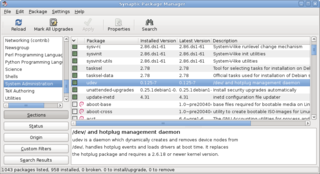Related Research Articles
The Comprehensive Perl Archive Network (CPAN) is a repository of over 250,000 software modules and accompanying documentation for 39,000 distributions, written in the Perl programming language by over 12,000 contributors. CPAN can denote either the archive network or the Perl program that acts as an interface to the network and as an automated software installer. Most software on CPAN is free and open source software.

Perl is a family of two high-level, general-purpose, interpreted, dynamic programming languages. "Perl" refers to Perl 5, but from 2000 to 2019 it also referred to its redesigned "sister language", Perl 6, before the latter's name was officially changed to Raku in October 2019.

A package manager or package-management system is a collection of software tools that automates the process of installing, upgrading, configuring, and removing computer programs for a computer's operating system in a consistent manner.
In computing, the Perl DBI offers a standardized way for programmers using the Perl programming language to embed database communication within their programs. The latest DBI module for Perl from CPAN can run on a range of operating systems.
urpmi is a package management tool for installing, removing, updating and querying software packages of local or remote (networked) media. It wraps around the RPM Package Manager in the role of a smart package manager. It uses repositories and will resolve dependencies so that the user will not suffer from dependency hell that can happen when using RPM directly. It works with official sources from Mandriva or unofficial sources such as those from the Penguin Liberation Front. It has a graphical front-end: Rpmdrake.
The PHP Extension and Application Repository, or PEAR, is a repository of PHP software code. Stig S. Bakken founded the PEAR project in 1999 to promote the re-use of code that performs common functions. The project seeks to provide a structured library of code, maintain a system for distributing code and for managing code packages, and promote a standard coding style. Though community-driven, the PEAR project has a PEAR Group which serves as the governing body and takes care of administrative tasks. Each PEAR code package comprises an independent project under the PEAR umbrella. It has its own development team, versioning-control and documentation.
Dependency hell is a colloquial term for the frustration of some software users who have installed software packages which have dependencies on specific versions of other software packages.
Pugs is a compiler and interpreter for the Raku programming language, started on February 1, 2005, by Audrey Tang.

LAMP is an acronym denoting one of the most common solution stacks for many of the web's most popular applications. However, LAMP now refers to a generic software stack model and its components are largely interchangeable.
ActivePerl is a distribution of Perl from ActiveState for Windows, macOS, Linux, Solaris, AIX and HP-UX.
A software repository, or “repo” for short, is a storage location for software packages. Often a table of contents is also stored, along with metadata. A software repository is typically managed by source control or repository managers. Package Managers allow for installing and updating the repositories versus having to do this manually.
Strawberry Perl is a distribution of the Perl programming language for the Microsoft Windows platform. Additionally, strawberry contains a fully featured MinGW C/C++ compiler with many libraries included. While most other distributions rely on the user having software development tools already set up to install certain Perl components, Strawberry Perl ships with the most commonly used tools preconfigured and packaged. It is a dramatic departure from other Perl distributions, and has influenced other distributions to provide such development tools in their own distribution.
Perl Archive Toolkit (PAR) is a cross-platform packaging and deployment tool for computer applications and libraries written in the Perl programming language. Its name is inspired by Java's JAR technology. It was originally developed by Audrey Tang and is now maintained via the PAR development mailing list with help from numerous contributors.

The Python Package Index, abbreviated as PyPI and also known as the Cheese Shop, is the official third-party software repository for Python. It is analogous to CPAN, the repository for Perl. Some package managers, including pip, use PyPI as the default source for packages and their dependencies. Over 235,000 Python packages can be accessed through PyPI.
Python Package Manager (PyPM) is a Python utility intended to simplify the tasks of locating, installing, upgrading and removing Python packages. It can determine if the most recent version of a software package is installed on a system, and can install or upgrade that package from a local or remote host.
Mojolicious is a real-time web application framework, written by Sebastian Riedel, creator of the web application framework Catalyst. Licensed as free software under the Artistic License v 2.0, it is written in the Perl programming language, and is designed for use in both simple and complex web applications, based on Riedel's previous experience developing Catalyst. Documentation for the framework was partly funded by a grant from The Perl Foundation.
The following outline is provided as an overview of and topical guide to the Perl programming language:
LuaRocks is a package manager for the Lua programming language that provides a standard format for distributing Lua modules, a tool designed to easily manage the installation of rocks, and a server for distributing them. While not included with the Lua distribution, it has been called the "de facto package manager for community-contributed Lua modules".
References
- ↑ Yevgeny Menaker; Michael Saltzman; Robert J. Oberg (2003). Programming Perl in the .NET Environment. Prentice Hall. pp. 155–156. ISBN 9780130652065.
- ↑ Dave Roth (2002). Win32 Perl Programming: The Standard Extensions. New Riders Press. pp. 13–16. ISBN 9781578702169.
- ↑ Paul Hoffman (2011). Perl For Dummies. Wiley. ISBN 9781118085189.
- ↑ David N. Blank-Edelman (2000). Perl for System Administration. O'Reilly Media. p. 6. ISBN 9781565926097.
- ↑ "Goodbye PPM, Hello State Tool". activestate.com. July 23, 2019.